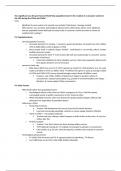How significant was the post-Second World War population boom in the creation of a consumer society in
the USA during the 1950s and 1960s?
Intro:
- Significant to some extent as it opened new markets (‘baby boom’, teenage market)
- Other factors: e.g. economy, technological advancements, deferral gov action, more significant
- Overall, population boom definitely increased scale of consumer society but alone it cannot be
credited with creating it
P1: Population Boom
- Overall population increase
o Increased demand for housing + consumer goods (production increased from $213 billion
1945 to $284 billion-worth of goods in 1950)
o More people lived in suburbs (larger families– contributed to car-owning culture, further
fuelling consumer society
o Increased demand for food even farmers did well and could partake in consumer society,
new market of fast-food
More fairly attributed to farm subsidies and war rather than population (demand for
farm goods abroad in war-torn Europe)
- Increase in birth rate
o Baby boom (birth rate was 113 in 1947) opened up market for child products (e.g. toy sales
made $1.6 billion in 1959, $2 billion 1961) children then grew to open up teenage market
in 1950s and 1960s (1959 survey showed teenagers spent about $10 billion a year)
However, Late 1960s, children of baby boom began to question culture of
consumerism, rejected consumption (e.g. growth of environmentalism and ‘hippy’
lifestyle) cannot explain 1960s consumerism
P2: Other Factors
- WW2 itself (rather than population boom)
o Psychological effects of the victory in WW2, emergence of US as a Cold War power
encouraged society to justify consumerism as the ‘American Way’
o WW2 stimulated economy, there was demand for goods people had gone without with
during the war (regardless of population boom)
- Federal gov. Action
o Monitoring economy:
Truman 1946 Employment Act set up Council of Economic Advisors
Low taxes (encourage spending), controls on money supply (monitor inflation)
o Harsh on strikes – encourage production
Truman took over railways, asked Congress to draft strikers to the army very few
strikes after this
o Financial support
Truman’s ‘Fair Deal’ policies for those leaving military service
1949 National Housing Act enabled more people to partake in consumerism
Later policies (e.g. 30 June 1961 Housing Act), enabled more long-term consumer
society
- Technological advancements:
o TV (1960, 85% of homes had TV) opened market of advertising, ‘TV dinners’
o Car (3,800 drive-ins by 1954, 1960-1980 30,000 malls built)




